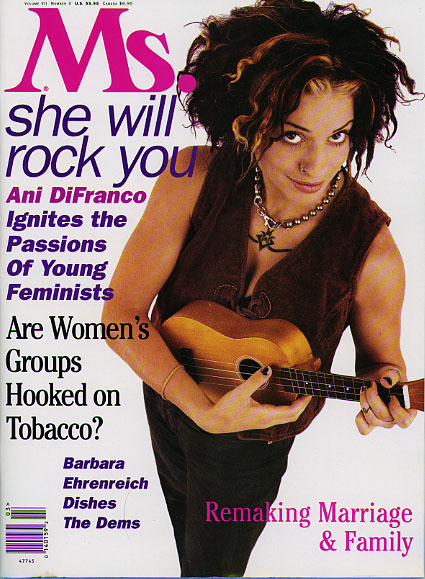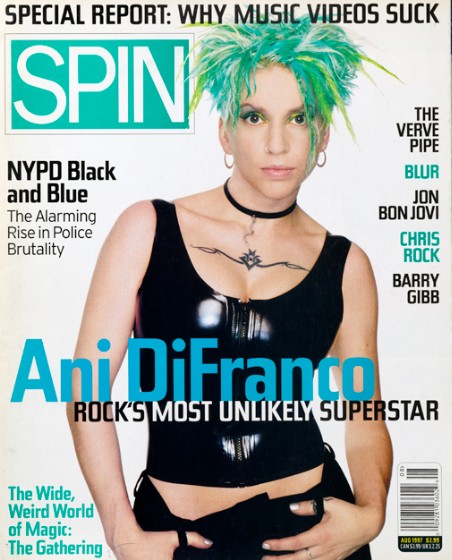The following is the full text from DiFranco’s letter:
“AN OPEN LETTER FROM ANI DIFRANCO TO THE EDlTORS OF MS … So I’m poring through the 25th anniversary issue of Ms.
(on some airplane going somewhere in the amorphous blur that amounts to
my life) and I’m finding it endlessly enlightening and stimulating as
always, when, whaddaya know, I come across a little picture of little
me. I was flattered to be included in that issue’s “21 feminists for the
21st century” thingybob. I think ya’ll are runnin’ the most bold and
babeolishious magazine around, after all.
Problem is, I couldn’t help but be a little weirded out by the
paragraph next to my head that summed up her me-ness and my relationship
to the feminist continuum. What got me was that it largely detailed my
financial successes and sales statistics. My achievements were
represented by the fact that I “make more money per album sold than
Hootie and the Blowfish,” and that my catalogue sales exceed 3/4 of a
million. It was specified that I don’t just have my own record company
but my own “profitable” record company. Still, the ironic conclusion of
the aforementioned blurb is a quote from me insisting “it’s not about
the money.” Why then, I ask myself, must “the money” be the focus of so
much of the media that surrounds me? Why can’t I escape it, even in the
hallowed pages of Ms.?
Firstly, this “Hootie and the Blowfish” business was not my doing. The L.A. Times
financial section wrote an article about my record label, Righteous
Babe Records, in which they raved about the business savvy of a singer
(me) who thwarted the corporate overhead by choosing to remain
independent, thereby pocketing $4.25 per unit, as opposed to the $1.25
made by Hootie or the $2 made by Michael Jackson. This story was then
picked up and reprinted by The New York Times, Forbes, the Financial News Network and (lo and behold) Ms.
So, here I am, publicly morphing into some kinda Fortune
500-young-entrepreneur-from-hell, and all along I thought I was just a
folksinger!
OK, it’s true. I do make a much larger profit (percentage-wise) than
the Hootster. What’s even more astounding is that there are thousands of
musicians out there who make an even higher profit percentage than me!
How many local musicians are there in your community who play gigs in
bars and coffee shops about town? I bet lots of them have made cassettes
or CDs that they’ll happily sell to you with a personal smile from the
edge of the stage or back at the bar after their set. Would you believe
these shrewd, profit-minded wheeler-dealers are pocketing a whopping
100% of the profits on the sales of those puppies?! Wait ’till the
Financial News Network gets a whiff of them!
I sell approximately 2.5% of the albums that a Joan Jewelanis
Morrisette (sic) sells and get about .05% of the airplay royalties, so
obviously if it all comes down to dollars and cents, I’ve led a wholly
unremarkable life. Yet I choose relative statistical mediocrity over
fame and fortune because I have a bigger purpose in mind. Imagine how
strange it must be for a girl who has spent 10 years fighting as hard as
she could against the lure of the corporate carrot and the almighty
forces of capital, only to be eventually recognized by the power
structure as a business pioneer.
I have indeed sold enough records to open a small office on the
half-abandoned main street in the dilapidated urban center of my
hometown, Buffalo (N.Y.). I am able to hire 15 or so folks to run and
constantly reinvent the place while I drive around and play music for
people. I am able to give stimulating business to local printers and
manufacturers and to employ the services of independent distributors,
promoters, booking agents and publicists. I was able to quit my day job
and devote myself to what I love. And yes, we are enjoying modest
profits these days, affording us the opportunity to reinvest in
innumerable political and artistic endeavors. RBR is no Warner Bros. But
it is a going concern, and for me, it is a vehicle for redefining the
relationship between art and commerce in my own life. It is a record
company that is the product not just of my own imagination, but that of
my friend and manager Scott Fisher and of all the people who work there.
People who incorporate and coordinate politics, art and media every day
into a people-friendly, sub-corporate, woman-informed, queer-happy
small business that puts music before rock stardom and ideology before
profit.
And me, I’m just a folksinger, not an entrepreneur. My hope is that
my music and poetry will be enjoyable and/or meaningful to someone,
somewhere, not that I maximize my profit margins. It was 15 years and 11
albums getting to this place of notoriety and, if anything, I think I
was happier way back when. Not that I regret any of my decisions, mind
you. I’m glad I didn’t sign on to the corporate army. I mourn the
commodification and homogenization of music by the music industry, and I
fear the manufacture of consent by the corporately controlled media.
Last thing I want to do is feed the machine.
I was recently mortified while waiting in the dressing room before
one of my own shows. Some putz suddenly takes the stage to announce me
and exclaim excitedly that this was my “largest sold-out crowd to date!”
“Oh, really?,” I’m thinking to myself, “that’s interesting … too bad
it’s not the point.” All of my achievements are artistic, as are all of
my failures. That’s just the way I see it. Statistical plateau or no.
I’ll bust ass for 60 people, or 6,000, watch me.
I have so much respect for Ms. magazine. If I couldn’t pick it
up at newsstands my brain probably would’ve atrophied by now on some
trans-Atlantic flight and I would be lying limp and twitchy in a bed of
constant travel, staring blankly into the abyss of the gossip magazines.
Ms. is a structure of media wherein women are able to define
themselves, and articulate for themselves those definitions. We wouldn’t
point to 21 of the feminists moving into the 21st century and define
them in terms of “Here’s Becky Ballbuster from Iowa City, she’s got a
great ass and a cute little button nose … ” No ma’am. We’ve gone beyond
the limited perceptions of sexism and so we should move beyond the
language and perspective of the corporate patriarchy. The Financial News
Network may be ultimately impressed with me now that I’ve proven to
them that there’s a life beyond the auspices of papa Sony, but do I
really have to prove this to you?
We have the ability and the opportunity to recognize women not just
for the financial successes of their work but for the work itself. We
have the facility to judge each other by entirely different criteria
than those imposed upon us by the superstructure of society. We have a
view that reaches beyond profit margins into poetry, and a vocabulary to
articulate the difference.
Thanks for including me, Ms., really. But just promise me one thing; if I drop dead tomorrow, tell me my grave stone won’t read: “ani d., CEO.”
Please let it read: songwriter, musicmaker, storyteller, freak.



No comments:
Post a Comment